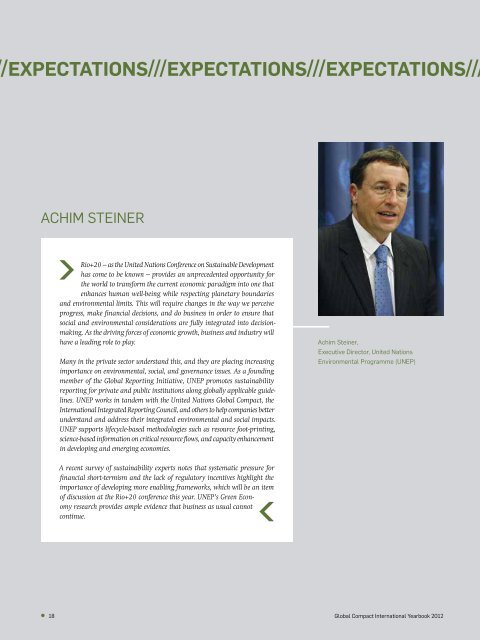Global Compact International Yearbook 2012
Schwerpunktthemen der diesjährigen Ausgabe sind der Rio+20 Summit, Strategic Philantrophy und CSR in Lateinamerika sowie ein ausführliches Dossier zum komplexen Themenfeld Corporate Foresight. Mit Beiträgen u.a. von Georg Kell, Kyle Peterson (FSG), Jerome Glenn (Millennium Project) sowie Achim Steiner (UNEP). Außerdem veranschaulichen best practice Beispiele von 42 Unternehmen aus verschiedensten Teilen der Welt die Integration der zehn Prinzipien des Global Compact in das jeweilige Unternehmensumfeld. 196 Seiten, FSC-zertifizierter und klimaneutraler Druck. ISBN-13:978-3-9813540-3-4
Schwerpunktthemen der diesjährigen Ausgabe sind der Rio+20 Summit, Strategic Philantrophy und CSR in Lateinamerika sowie ein ausführliches Dossier zum komplexen Themenfeld Corporate Foresight. Mit Beiträgen u.a. von Georg Kell, Kyle Peterson (FSG), Jerome Glenn (Millennium Project) sowie Achim Steiner (UNEP). Außerdem veranschaulichen best practice Beispiele von 42 Unternehmen aus verschiedensten Teilen der Welt die Integration der zehn Prinzipien des Global Compact in das jeweilige Unternehmensumfeld.
196 Seiten, FSC-zertifizierter und klimaneutraler Druck.
ISBN-13:978-3-9813540-3-4
Create successful ePaper yourself
Turn your PDF publications into a flip-book with our unique Google optimized e-Paper software.
Agenda Rio + 20<br />
/Expectations///Expectations///Expectations///Expectations///Expectations///Expectations///<br />
Andrei Galaev<br />
Achim Steiner<br />
Decisions made at global conferences have great effects on CSR and<br />
sustainable development progress and concept advancement. I believe<br />
that the Rio+20 United Nations Conference on Sustainable Development<br />
will be the next milestone in international efforts to accelerate progress<br />
toward achieving sustainable development globally. It is an opportunity for<br />
participants to honestly and openly discuss what has been achieved in the<br />
last 20 years since Agenda 21 at the Earth Summit in Rio; what the biggest<br />
challenges and issues have been; and whether governments, business, the UN<br />
system, and other parties have managed to address them effectively.<br />
Rio+20 – as the United Nations Conference on Sustainable Development<br />
has come to be known – provides an unprecedented opportunity for<br />
the world to transform the current economic paradigm into one that<br />
enhances human well-being while respecting planetary boundaries<br />
and environmental limits. This will require changes in the way we perceive<br />
progress, make financial decisions, and do business in order to ensure that<br />
social and environmental considerations are fully integrated into decisionmaking.<br />
As the driving forces of economic growth, business and industry will<br />
have a leading role to play.<br />
Many in the private sector understand this, and they are placing increasing<br />
importance on environmental, social, and governance issues. As a founding<br />
member of the <strong>Global</strong> Reporting Initiative, UNEP promotes sustainability<br />
reporting for private and public institutions along globally applicable guidelines.<br />
UNEP works in tandem with the United Nations <strong>Global</strong> <strong>Compact</strong>, the<br />
<strong>International</strong> Integrated Reporting Council, and others to help companies better<br />
understand and address their integrated environmental and social impacts.<br />
UNEP supports lifecycle-based methodologies such as resource foot-printing,<br />
science-based information on critical resource flows, and capacity enhancement<br />
in developing and emerging economies.<br />
A recent survey of sustainability experts notes that systematic pressure for<br />
financial short-termism and the lack of regulatory incentives highlight the<br />
importance of developing more enabling frameworks, which will be an item<br />
of discussion at the Rio+20 conference this year. UNEP’s Green Economy<br />
research provides ample evidence that business as usual cannot<br />
continue.<br />
Achim Steiner,<br />
Executive Director, United Nations<br />
Environmental Programme (UNEP)<br />
Andrei Galaev,<br />
CEO, Sakhalin Energy Investment<br />
Company Ltd.<br />
UN <strong>Global</strong> <strong>Compact</strong> Board Member<br />
I hope that at the Rio+20 conference, and in particular the Rio+20 Corporate<br />
Sustainability Forum, the business community will demonstrate a proactive<br />
stance and desire to move forward regarding sustainable development, sustainability<br />
leadership, and contributions to the Millennium Development Goals.<br />
The Rio+20 Corporate Sustainability Forum, under the umbrella of the UN<br />
<strong>Global</strong> <strong>Compact</strong>, is a great platform to meet business leaders, international<br />
institutions, CSR experts, as well as public and other stakeholders. As CEO of<br />
Sakhalin Energy and Chairperson of the <strong>Global</strong> <strong>Compact</strong> Network in Russia,<br />
I am proud to have the opportunity to participate in Rio+20 and contribute<br />
toward its goals: to define pathways to a safer, more equitable, cleaner, greener,<br />
and more prosperous world for all.<br />
For our part, we are open to learning opportunities and ready to share experiences.<br />
Sakhalin Energy participated in the pilot project of the UN Guiding<br />
Principles on Business and Human Rights that were developed by Professor John<br />
Ruggie and endorsed by the UN Human Rights Council last year. I sincerely<br />
share Professor Ruggie’s opinion that “the era of declaratory CSR is over; we<br />
have moved into ‘prove it.’” This can certainly be one of the key challenges.<br />
I think it is important to discuss lessons learned at Rio+20, to share best practices<br />
and proven sustainability models – especially partnership ones – and to<br />
pay special attention to practical global commitments on human rights and<br />
accountability. As a business representative and newly appointed UN <strong>Global</strong><br />
<strong>Compact</strong> board member, I see that it is critical to take new, practical, and<br />
measurable commitments on sustainability goals with clear targets, institutional<br />
frameworks, and responsibilities for sustainable development.<br />
I trust that human rights will be a core approach and core principle<br />
to these new commitments.<br />
18<br />
<strong>Global</strong> <strong>Compact</strong> <strong>International</strong> <strong>Yearbook</strong> <strong>2012</strong><br />
<strong>Global</strong> <strong>Compact</strong> <strong>International</strong> <strong>Yearbook</strong> <strong>2012</strong><br />
19

















